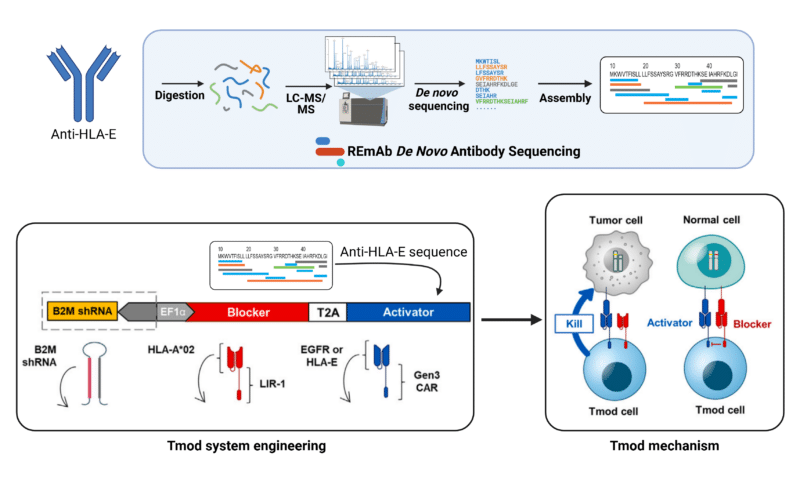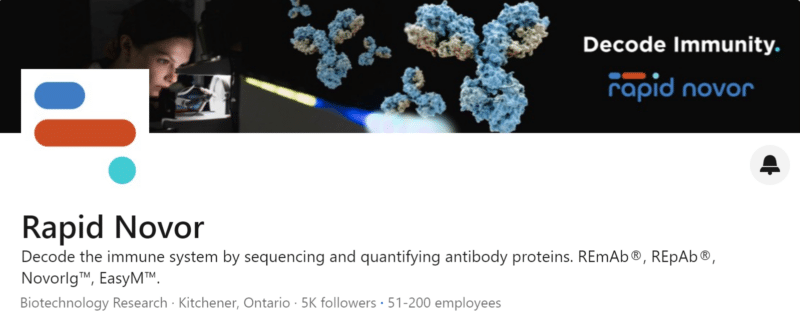Oh J, Kirsh C, Hsin JP, Radecki KC, Zampieri A, Manry D, Ando Y, Miller S, Chan J, McLeod E, Cunningham KM, Wong LM, Xu H, Kamb A. NOT gated T cells that selectively target EGFR and other widely expressed tumor antigens. iScience. 2024 May 7;27(6):109913. doi: 10.1016/j.isci.2024.109913.

A2 Biotherapeutics used REmAb ® monoclonal antibody sequencing to derive the amino acid sequence of an Anti-HLA-E antibody, which was used to engineer a Tmod system.
Key Takeaways
- Tumor-associated antigens (TAAs) are key targets for cancer cell and immunotherapies but risk causing cytotoxic effects on healthy tissues.
- Tmod cell therapy uses a dual-receptor approach for selective targeting: one receptor targets tumor antigens, while another blocks effects on healthy cells.
- EGFR and HLA-E, though broadly expressed in normal cells, can serve as activators in Tmod systems.
- Monoclonal antibody sequencing facilitated the engineering of Tmod constructs by deriving amino acid sequences from commercial antibodies targeting common antigens.
Summary
Distinguishing between tumor and normal tissue is a challenge in cancer drug discovery. Tumor-associated (TAAs) and tumor-specific antigens (TSAs) are essential markers, but TSAs are rare, and TAAs are often present in healthy tissue, which can lead to unwanted cytotoxic effects.
The goal is to create therapies that selectively target cancer cells while sparing healthy ones. The Tmod (tumor-modulating) system offers a precise cell therapy approach, using a dual-receptor mechanism: an activator targets tumor antigens, while an inhibitory receptor blocks action on healthy cells.
In 2024, researchers at A2 Biotherapeutics developed a potent Tmod cell therapy using epidermal growth factor receptor (EGFR) or human leukocyte antigen-E (HLA-E) as activators, with HLA-A as a blocker to protect normal tissues. They used REmAb® monoclonal antibody sequencing to derive the anti-HLA-E antibody sequence, engineering it into a 3rd generation CAR construct co-expressed with HLA-A as a blocker.
In vitro and in vivo murine models showed that Tmod systems with EGFR or HLA-E as activators achieved selective cytotoxicity. Despite EGFR and HLA-E being widely expressed in both healthy and cancerous tissues, the Tmod system offers a promising solution for tumor selectivity—even with broadly expressed antigens.
Talk to Our Scientists.
We Have Sequenced 10,000+ Antibodies and We Are Eager to Help You.
Through next generation protein sequencing, Rapid Novor enables reliable discovery and development of novel reagents, diagnostics, and therapeutics. Thanks to our Next Generation Protein Sequencing and antibody discovery services, researchers have furthered thousands of projects, patented antibody therapeutics, and developed the first recombinant polyclonal antibody diagnostics.
Talk to Our Scientists.
We Have Sequenced 9000+ Antibodies and We Are Eager to Help You.
Through next generation protein sequencing, Rapid Novor enables timely and reliable discovery and development of novel reagents, diagnostics, and therapeutics. Thanks to our Next Generation Protein Sequencing and antibody discovery services, researchers have furthered thousands of projects, patented antibody therapeutics, and ran the first recombinant polyclonal antibody diagnostics

